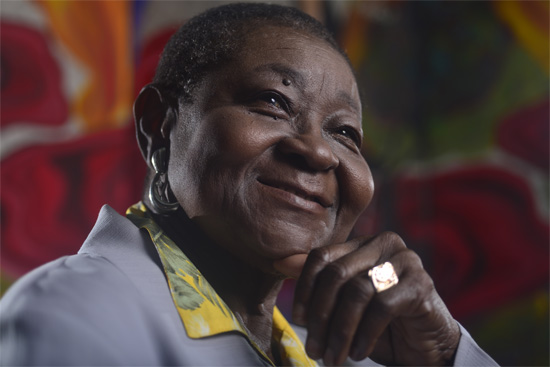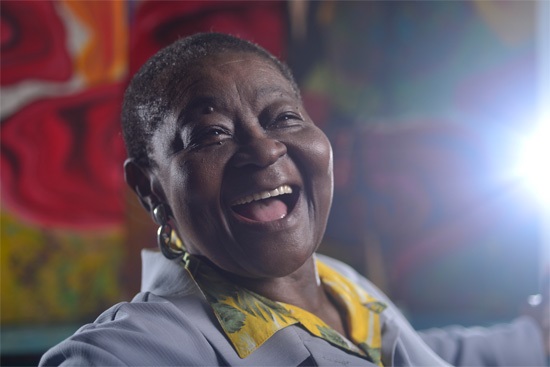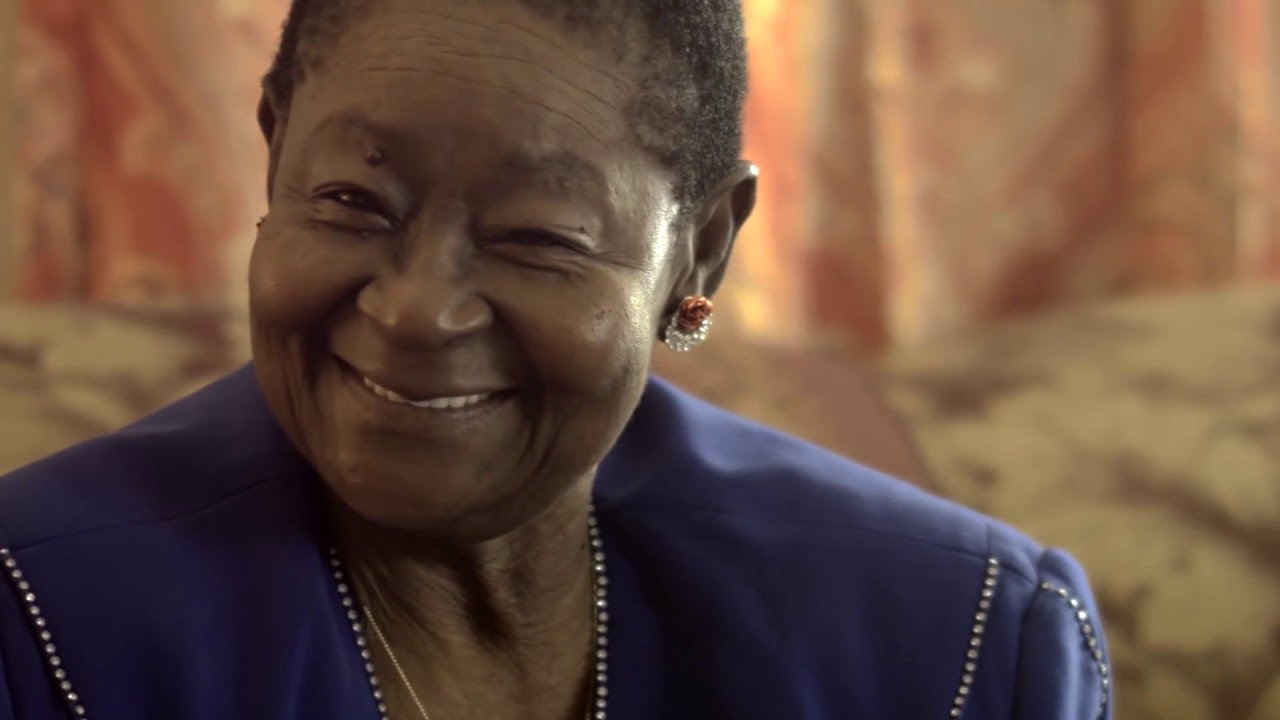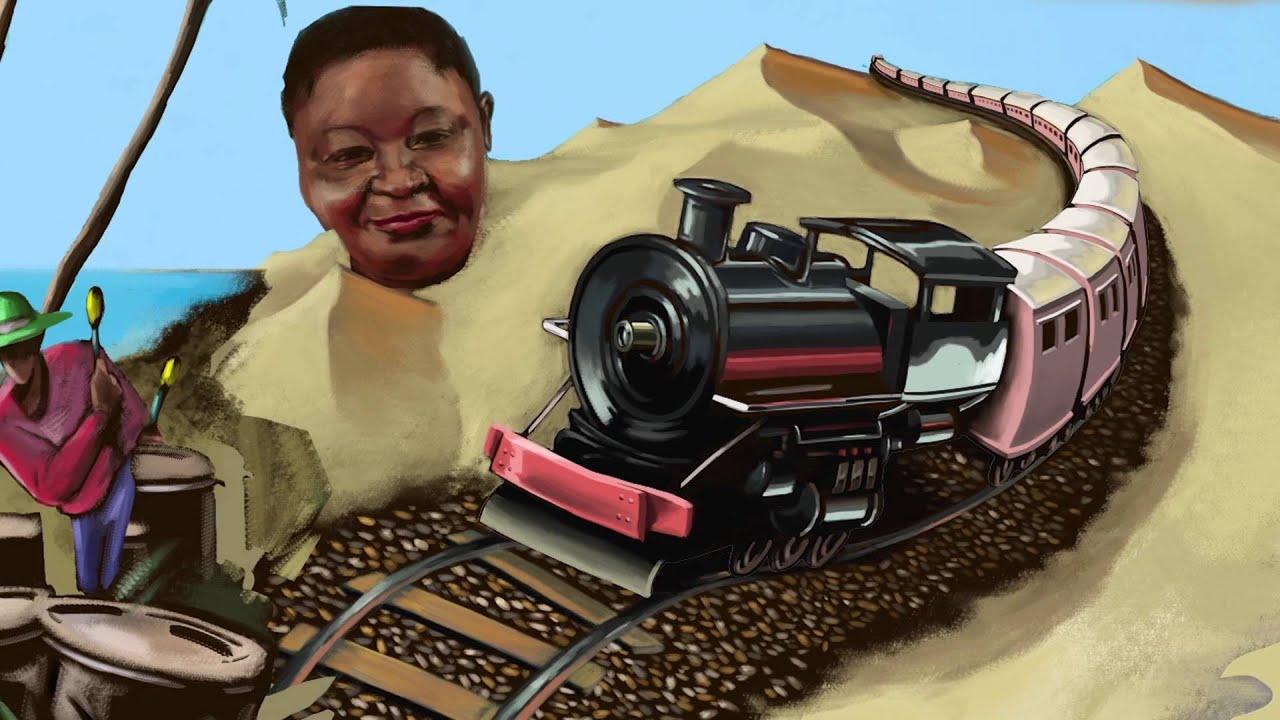If we ask you about the Calypso Queen, do you know who we mean? It is the title Calypso Rose has held for 40 years, something she celebrates on new track, ‘Calypso Queen’ from her upcoming Far From Home album. She playfully boasts on the track: "No man alive or dead could take the crown off mi head." On the new album the singer continues to break new ground, not just for calypso vocalists, but also for the people she represents through her songs.
Born McArtha Linda Sandy-Lewis in Tobago in 1940, as one of 11 children she left her parents aged nine to live with her aunt and uncle in Trinidad. As a youngster she was inspired by her aunt’s love of music and was a regular at carnivals on the Caribbean island. Here, she fell in love with calypso music and began performing aged 15 as the Crusoe Kid, inspired by Daniel Defoe’s famous novel, later reinventing herself as Calypso Rose when she turned professional.
Her move into music was not supported by everyone however. Her father, a spiritual Baptist minister, felt the music "belonged to the devil" and early on Rose also faced opposition from female church groups.
"They felt that calypso was a man’s domain, and calypso was not good for a woman to sing, because of the rhythm of the beat," said Rose. "So, I told them, ‘God has given me the talent to compose, to create, and I will not be like the foolish virgin and bury my talent in the soil.’ And from that last meeting, I walked off. And thank God I did, because right now they honour me."
After dominating carnival competitions, where she was named Calypso Queen five years running, Rose has gone on to become an ambassador for the music around the world. Her song ‘Fire In Me Wire’ has been translated into nine languages and she has introduced calypso to a wider audience through collaborations with Bob Marley, Michael Jackson, Miriam Makeba and The Manhattans, among many others.
Since the age of 13 Rose has written more than 800 songs on albums including 1968 debut Queen Of The Calypso World and Sexy Hot Pants. When asked what the key is to knowing when she has a "hit," Rose said: "Well, I always try to write things to please my fans, you know? To please my fans and put my fans in front of me first and consider myself performing these songs and how will they react.
"The secret is that I always like to keep abreast of things that are going on, to make people happy because of the amount of turmoil they have in the world today. There are homes that have been destroyed with drugs and abuse and these sad situations and I always try to make joy in the hearts of the people. I always try to write things that they enjoy and take away all the sadness from their minds and their thoughts. To make them happy.
"They are the ones that give me the inspiration to create, my fans."
This prolific songwriting could in part be due to the expectation that calypsonians were expected to write 12 songs each year, in order for the steel pan musicians to hear the songs and arrange their music ahead of the annual carnival competition.
"It is very important that calypsonians have new calypsos," said Rose. "But sometimes it’s only three songs the radio station will play and the rest go to waste. So I was the first calypsonian to cut down on the amount of tunes being written, to four or five songs. And then the other calypsonians start following me. Then I took it back up to 12!"
Portraits of Calypso Rose by Richard Holder
When tQ speaks to Calypso Rose over the phone a week before her 76th birthday she was in a hotel room in France on a day off from a European tour supporting the recently released compilation Calypso Soundsystem Feat. Calypso Rose Queen Of Calypso For 40 Years!. After recent health scares Rose is fit and "doing much better now" and the concerts, including a London show with Buena Vista Social Club, had been going very well.
"We play in countries where they do not speak English," said Rose. "But when I sing and I dance, they sing and they dance. And if you had seen them last night, oh my gosh…"
Following a recent concert for students in France, Rose was presented with dozens of letters from children writing to tell her that, "despite what you have gone through in your life, you are still here bringing joy to us". Rose adds, "Some of the letters make me cry. Yes, man. To know that I could bring joy in the hearts of the kids."
Far From Home finds Rose in fine form, with lyrics as sharp and feisty as ever as she sings, "I’ve been breaking down walls ever since I was small" over soca rhythms. The album was recorded with Ivan Duran in Belize, where Rose has a special relationship, having been made an honorary citizen after writing "too many" calypso songs for the country over the years, including ‘Leh We Punta’ and ‘Fire In Belize’.
On new the album Rose pays tribute to her African ancestors and the music they brought with them on the song ‘I Am African’.
Rose said: "I wrote that because I am an African descendent. My great grandmother was from Guinea, and on my father’s side, the slave Sandy was from South Africa, who ended up in Scotland and was shipped to Tobago. And he is the one that went to the government general house to free the slaves. So I have African within me.
"The calypso beat originates out of West Africa and the rhythm of the drums… Oh my God, send me crazy with the rhythm of the drums."
In conversation, as on many of her calypso songs, Rose speaks in the pidgin dialect used in Trinidad and Tobago, and at this point Rose bursts into song with some of the lyrics:
"I am an African, and my blood is hot!
I’m a West Indian, I love to dance a lot
I’m born with rhythm and I owe it to the rhythm, man."
The new album features Manu Chao, who guests on ‘Leave Me Alone’ and ‘Far From Home’. Chao added his contributions at later recording sessions in Barcelona and the pair are set to perform live together for the first time this summer.
"Manu did a fantastic job with the album," said Rose of the completed tracks. "I met him when he came to Trinidad last year for the carnival and we sat for three hours and spoke. It is so fascinating and I love the different changes."
Rose was inspired to write another of the new tracks in the studio while the others were taking a break. "I picked up the guitar and I went in the next room, and I wrote, ‘Leave Me Alone’," she said. "You know, I go to the party with you and you want to leave and go home? To do what? Let me enjoy myself, let me dance and be happy and spend time with my fans and my friends and family, so leave me alone! Those boys don’t touch me! Let them go crazy!"
The album also features a reworking of one of Rose’s 1970s songs – ‘No Madame’, that highlighted the treatment of domestic servants in Trinidad and Tobago.
"It was an issue that has been going on for years," said Rose. "I listened to the cries of the domestic servants, who were working, but they were not getting enough salary. You have to take care of the children, the wife, the husband, the house, the cousins. The mother and father work and they [the servants] have to do everything. Sometimes they go to bed at 1’o clock in the morning and have to get up at 5am, 6am to take care of the kids and take them to school, to make sure the husband and wife get their breakfast."
The song’s powerful message about the working conditions of domestic servants eventually led to a change in the law.
"A journalist from Italy came for the carnival and heard the calypso," explained Rose. "When she went back to Italy she wrote about the domestic servant situation in Trinidad and Tobago. The prime minister read the story and discussed it in a cabinet meeting. They worked on the issue and the law was passed that no domestic servant could work for less than $1,500 a month. So that is something I have done for the nation. Not only for Trinidad and Tobago, but for the other Caribbean islands, because the rest of the Caribbean islands followed the trend of what Trinidad and Tobago did and that was something very, very good."

It is not just Rose’s lyrics that have led to social changes. The Calypso Queen also played an active part in reforming the male dominated carnival traditions to include women.
"When I won the calypso way back in 1975, the name used to be the Calypso King competition," said Rose. "In 1977 we became a republic nation and in a republic nation there are no kings, no queens, they are monarchs. So in 1978 I became the first calypsonian to ever win such title. And the tune I sang, ‘I Thank Thee’, I sang because I wanted to export my music internationally. So I thanked the musicians, I thanked my mother, the steel pan men, I thanked the calypsonians… I thanked everybody, because I knew what I wanted to do. I wanted to export myself and my music. Thank God I wrote that calypso and now my music is all over the world."
And Rose recommends that others follow her lead: "Anything you want to do in life, do not let nothing stop you, or doubt you. Just pursue whatever you want to do in life. Do not let anything dull your spirit. Just go through and do and you will be successful in whatever you want to do. Once you put your mind to it, you will be successful."
Calypso Rose’s new album Far From Home is out on July 15 through Because Music




